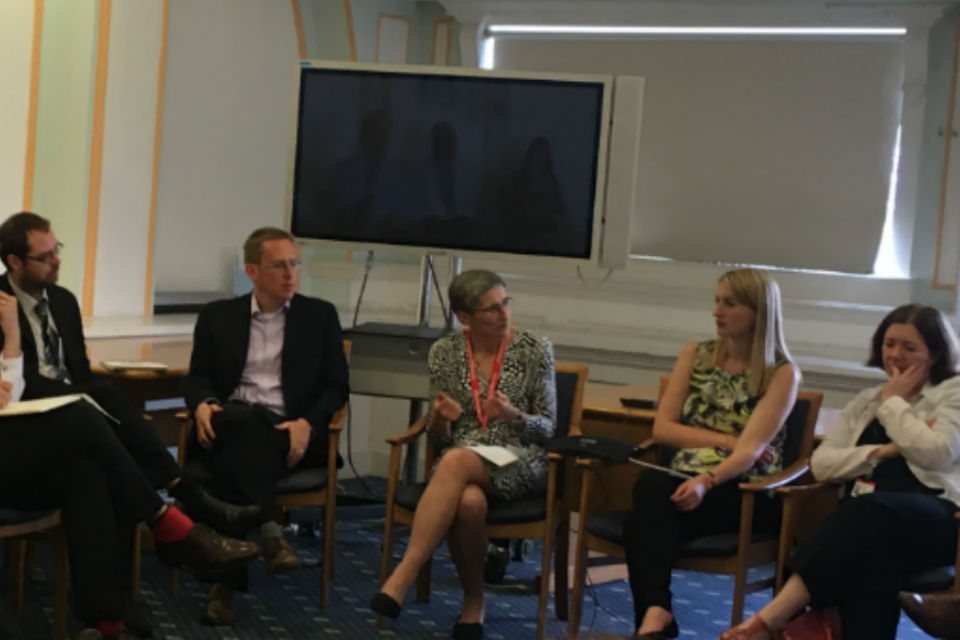
I’ve been blown away by the number of comments on my recent blog In praise of vulnerability. Thank you to everyone who shared their views. Whether you think I’m on the right lines or you profoundly disagree with me, it’s great to have this level of debate about how we lead in the Civil Service.
Rather than respond to comments individually, I thought I’d try and take the conversation a step further, building on the rich range of opinions that have been expressed.
First, just for the record, I’m not suggesting that anyone should be obliged to share information when they’re not comfortable doing so. As I said in my original blog, I recognise that people come from very different places in terms of their appetite for sharing personal information. And of course not all information is the same.
Sharing the fact that you enjoy gardening or volunteer in your community is one thing. Admitting you’ve had a bad day at work, or an argument with your partner, is quite another. And disclosing your mental health status or sexual orientation is of a different order again. None of us is going to do that unless we trust and feel supported by the people we are sharing the information with.

The real point for me is what we can do as leaders to create the conditions where that trust exists. In short, to move the ‘comfort dial’ so that more people feel comfortable sharing a bit more.
You might say, why should we? Some people who commented on my earlier blog said that they just couldn’t see why they’d want to mix up their professional and personal lives. I respect that view, but personally I don’t share it. Connectedness is one of the elements of trust, and to connect with people we need to see them as whole people, not just people who perform particular tasks at work.
Knowing more about someone makes us more likely to respect them. It also helps us to stand in their shoes. That is the essence of empathy, which is as important for how we serve the public as it is for creating 'a great place to work'.
A number of people who commented on my blog had had bad experiences of opening up to other people, with information shared inappropriately or, it was felt, used against them. To you, I can only say sorry. I can absolutely understand why your natural reaction is to say, “why would I do that again?” But we will be poorer as an organisation if you don’t feel able to. As leaders of the Civil Service, we are determined to become the most inclusive employer in the country. Making sure that experiences such as this are a thing of the past is an important part of that determination.
Exposing our vulnerability, sharing personal information, opening up – call it what you will – is one of those things where no-one wants to go first. Why would you? It’s a risk. But as a leader I’m better placed to take that risk and model the behaviour that I think will make us the best we can be. If that encourages just one person to follow, it’s worth it.
Follow Clare on Twitter: @ClareMoriarty.

5 comments
Comment by Karl Pope posted on
As a person who has a long term mental health problem, I believe it is the quality of a manager that you have and their own personal understanding and perception of mental health that can either enhance your experience in the workplace, or it can be very detrimental to your mental health issues. I feel that a lot of people look at me and think well he looks well, he keeps himself reasonably fit, but he states he has mental health issues, but looks normal, this is where it then becomes this question mark over you. Not everyone who has a mental health issues, its drugged up to the eyeballs and has no understanding of the world around them, but this is the impression that I get from some of the managers who have line managed me over past 16 years, that anyone who has a mental health issues, should meet the general characteristics of the public’s perception of someone who is afflicted by a mental health condition. I am quite open about my mental health issues and will freely talk to anyone who wants to ask me a question. If I could ask for one thing from the Civil Service is for the staff to lead the issues on mental health and not managers. I would welcome a Mental Health Champion in each Civil Service site, not a mental health first aider, but someone that who is happy to help both managers and staff who are dealing with/coming to terms with their mental health issues. That they have a good understanding of the main issues facing people with mental health issues, as well as a good understanding of how the Civil Service want to take this very important issue forward, but also that they have a very good understanding of their own Departmental polices, which then enables them to work across the whole of the Civil Service, so that a more joined up approach towards mental health is undertaken. I have no stigma around me having a mental health issue, I think it should be a clear objective of the Civil Service to not use such words as “stigma” as it can put people off or feel categorise, when all they want is to be able to come into work, complete a good days work and go home, but also know that if they have a problem coping because of their mental health condition or changes in their condition, that there is someone in the workplace that they can go to for support, outside their line management chain if they wanted to.
Comment by Stephen posted on
Clare - Have you seen Brene Brown's TED talk on vulnerability? in fact she has done two. They are good ! and speak directly of the kind of personal development that funds professional development too.
Comment by Clare Rivers Mohan posted on
I have a mental health disability and try to be as open about it as possible/reasonable - at least on the same level as when colleagues are experiencing physical illnesses, but it is tricky. It can feel like admitting to something shameful or overly personal, even in a friendly and welcoming team like the one I currently work on.
I would love to see the culture change and for mental health to be as commonplace a topic as one's physical health - if you're feeling emotionally run down as well as physically it's important to be able to talk about it, even (especially!) in casual conversation. Does anyone else have comments on how to make that a reality?
Comment by Jeremy Leggett posted on
I am intrigued by the concept that opening up about personal matters should be seen as analogous to exposing ones areas of vulnerability. The very idea of 'protected characteristics' in EO legislation is specifically to avoid some particular personal attributes making people vulnerable. In the context of DEFRA some very important personal attributes are not 'protected characteristics', such as people's rurality or intrinsic connectedness with place. There is very little protection for rural people from becoming the victim of urban-centric decision making that is insensitive to a very real vulnerability that comes from living in a rural location. Of course DEFRA should seek the highest possible standards when dealing with its own employees, but perhaps a little more focus on the vulnerability of rural people to urban decision making and random acts of market failure would not go amiss as well.
Comment by Charlotte Smith posted on
As a suggestion, perhaps you could visit some of the DWP workplaces up and down the country and speak to people directly in forums. Get a "feel" of what is going on the workshop floor.
There are feelings i would like to share on being bullied and victimised in the past year or so. I have only recently just recovered from all of that and am looking to plan a better future now and focus on me, getting me back into shape and focus on getting my job back on track. However i cant share those feelings publically, even in forums as it would have negative impact. I would prefer to think postively from now on!